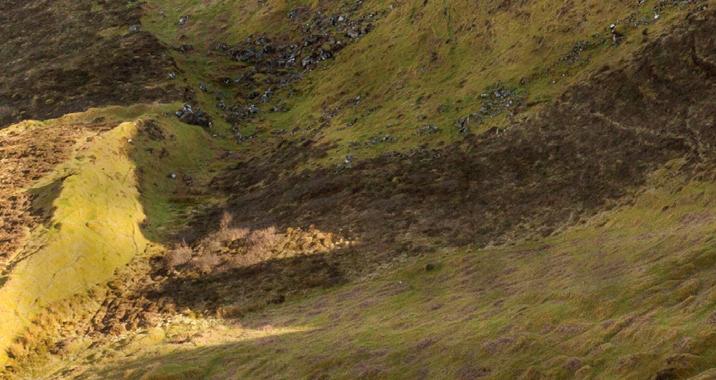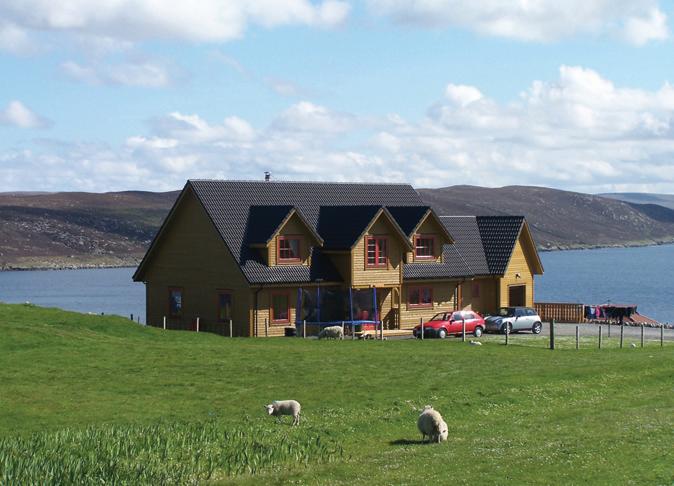
6 minute read
Remote realities



Most people reading this magazine will be working in lowland areas, and almost certainly somewhere on the mainland. How does life diff er for those providing electrical, heating or renewables services in the more remote parts of the Highlands or on Scotland’s islands?
Macleod Construction, based in Lochgilphead in Argyll, provides construction, refurbishment and maintenance services, including plumbing and electrical work, to clients scattered throughout Argyll: north to Oban, east to Dunoon and south to the Mull of Kintyre – and on neighbouring islands including Islay, Coll and Tiree.
Services manager Jonathan Macleod explains that the company was founded by his father and uncle, Kenny and Murdo, in 1975. After a spell working in Glasgow, Jonathan returned to the business in 2010 to set up a plumbing and electrical division, which has since expanded to employ 20 people, within an overall workforce of about 220.
Just getting people to where they will be working can be diff icult in an area with few main roads. Those working on the islands can sometimes be stranded by cancelled ferries, adding costs for overnight accommodation and delaying work at the site in question, with knockon eff ects elsewhere. If the weather is really bad it can delay construction projects on some sites for weeks or even months.
But a more fundamental challenge is recruitment. “The number of skilled, trained, competent people in the area is very limited,” says Jonathan Macleod. “It’s taken a long time to build up to the number that we have now.”
However, the company has had some success in finding people who are happy to bring up children in what is a beautiful rural area. “It can be a good life here,” he says. “There’s little in the way of anti-social hours, and no overtime. You get a good quality of life outside work.”
Working in the Highlands and Islands off ers contractors a lifestyle and scenery few places can compete with. Yet there are also some practical diffi culties that need to be overcome
By David Adams
Hiring headaches
About 40 miles north-west of the Scottish mainland lie the Western Isles, a 130-mile-long curve of more than 60 rocky, windswept, but beautiful islands, including Lewis/Harris, North and South Uist and Barra. Alex Murray Construction, founded in 1990 by Alex and Annette Murray, provides services – including the installation of air source heat pumps, biomass boilers, solar thermal heating and solar photovoltaic cells – on all the islands.
The company employs about 75 people. But recruitment is often diff icult here, too. “We’ve spent a small fortune on training over the years,” says the Murrays’ son Steven, project development manager at the company. “It’s rare that you find someone with the type of skills that you need, and it’s diff icult to get people to come from the mainland to work here.”
Just getting to work can be tricky. Travelling from the firm’s base in Stornoway, on Lewis, to the southernmost large island Barra entails a two-hour drive across Lewis/Harris, then an hour on a ferry, then a one-anda-half hour drive, then finally another 40-minute ferry journey to Barra. Again, cancelled ferries can strand staff for hours, or overnight.
The islands’ infrastructure also creates problems that would be novel to most readers: the smaller, winding, hilly roads can take a toll on the company’s vehicles. In addition, although the week before we speak 4G mobile connectivity has arrived in Stornoway, mobile reception is worse elsewhere. “On the mainland, a lot of firms now have an iPad in the van and it’s easy to do a lot of your work using that when you’re out and about,” says Steven Murray. “We can’t really go down that route just yet.”
Logistical nightmares
On the Shetland Isles, the most northerly islands in the UK with a population of about 22,000 people, another family business, E&H Building Contractors, specialises in building low-energy Scandinavian-style timber homes and installation and maintenance of heating systems, including heat pumps, solar thermal, biomass boilers and electrical systems. It employs about 30 people.
“The most important thing for us is reliability and back-up for installed equipment,” says joint managing director Bobby Elphinstone. “If you have an appliance breaking down in winter and people lose their heating and hot water, it’s no good waiting a week or more for parts from the mainland. We need things up and running in hours.”
Transport and logistics in Shetland are not bad: ferry crossings between the islands are mostly short and rarely disrupted by the weather. The main challenge is that everything the company uses has to come from the mainland – often including staff .
Around 12 years ago the company recruited several Polish and Hungarian staff , some of whom were already in the UK, with Elphinstone and some of his colleagues also travelling to Hungary to interview candidates. Today, about a quarter of the company’s staff are still Polish or Hungarian. There has been some turnover, but some of the original applicants have decided to settle in these windy but friendly islands.

Skye’s the limit
Being island-based can even make life more complicated when the island is actually joined to the mainland, as Skye (population about 10,000) has been since completion of the Skye Bridge in 1995.
Billy Shanks has been co-owner of Shanks Plumbing and Renewables, in the north of Skye, since he and his wife Emma bought the company from his former employer two years ago. They have seven employees and do almost all their work on the island.
Bearing that in mind, the number of miles the company’s vans cover is remarkable, owing to the way the island’s minor roads twist around its mountains and moors. “Two of us are probably doing 25,000 to 30,000 miles in a year,” says Shanks. “And it’s hard: the roads aren’t good.” Journey times vary by the season. “Winter’s not so bad, because the traff ic’s light,” says Shanks. “But in summer it’s horrendous, with the amount of tourists we get.”
Some of his clients own holiday cottages, but they may live elsewhere and not understand the logistical problems Shanks and his staff face when trying to reach their properties for an emergency call-out – or to solve a problem when they get there.
“We can’t get parts quickly,” says Shanks. “We do have suppliers on the island, but they’re not renewables specialists, for example. Trying to explain to holiday home owners that their properties might be without heating for 10 days can be diff icult.”
Dealing with suppliers can be problematic, too. “The quickest way to get anything here is by post, but sometimes suppliers use their own carriers and it can take 10 days,” he says.
Fibre is bringing faster broadband to more parts of the island. Mobile reception remains patchy, although sometimes this can be a blessing, he says. Recruitment is diff icult here, too. But the company takes on at least one apprentice every year, and the lure of Skye seems to encourage many people to stay. “The real upside is the scenery,” says Shanks. “It really is a lovely place.”
Indeed, despite all the challenges faced by people working in the Highlands and Islands, that is one thing they seem to agree on. Even if you’re so wrapped up in work that you barely notice where you are, even when the weather makes life diff icult, there really is no place like home.
> E&H is based in Shetland




